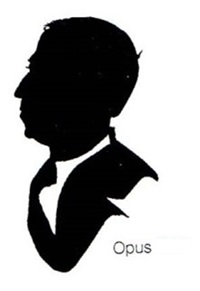Author: Associate Professor Felix Behan
Creating fiction to amplify history is a modern compositional trend where embellishment comes at a cost of truth. One must quote Lord Byron’s statement of 1824 in his epic poem Don Juan '… for truth is always strange; stranger than fiction ...' because as Mark Twain later observed ‘Truth is stranger than fiction, but it is because Fiction is obliged to stick to possibilities; Truth isn’t’.
In my 2013 Surgical News article I quote from Simon Winchester’s book The Surgeon of Crowthorne and the origin of the Oxford English Dictionary (OED). Adding novels or fictive history just add a new slant.
This bestseller, written by Pip Williams, The Dictionary of Lost Words recounts how words about women and the working class were inadvertently omitted from the original OED publication and we know not why. Is it the blind leading the blind when Sarah Ogilvie wrote her book The Dictionary People?
The story begins at the Mill Hill School and the president of the Philological Society (study of language), Murray, had his scriptorium of words alphabetically aligned.
My The Surgeon of Crowthorne book, costing $2 at the Brotherhood op shop—opened my mind to the importance of historical accuracy. Who wants a bestseller based on inaccuracies?
Any scientific mind, as Pasteur often inferred ‘we devour truth’ and there is no substitute for accuracy. And those that have a yearning for this concept merely reflect the statement that truth surfaces in time— like cream in fresh milk.
In synopsis, the OED story started from the humble beginnings of the Philological Society in London in the 1850s and Richard Chenevix Trench, Dean of Westminster, laid down the need in 1857 for a new English dictionary. Two months later the Philological Society invited the Oxford dignitaries to participate, inviting many readers to contribute their new words.
James Murray’s skills catalogued the various words in alphabetical order from his correspondence in the scriptorium at Mill Hill School in London. Thus began the saga with many contributors sending umpteen entries and that is where The Surgeon of Crowthorne comes in.
On reaching the letter C in the alphabet, the coronation word emerged, and they dedicated this new work to Queen Victoria on her 60th anniversary of her reign and the ’C‘ Day.
My mentor in Plastic and Reconstructive Surgery Sir Benjamin Rank, named his new house in Heidelberg Mill Hill in the late 1940s, presumably recalling his Barnet days when working with Gillies in London at that hospital.
Mill Hill at the time was a centre of scientific research under the directorship of Sir Henry Dale, the discoverer of the neuromuscular transmitter acetylcholine for which he gained the 1936 Nobel Prize—another historical fact. Mill Hill was also the name of one of the Rank family farms. Did this also contribute to the naming of his new home in Heidelberg? Thus, there could be two factors why Benny called his house Mill Hill.
Dr Minor, the surgeon of Crowthorne was the product of the American Civil War (1861-1865) and at an army tribunal had to witness the mutilation of a deserter by having his face branded with a hot iron. This affected him psychologically and when in London, suspicious of a shady figure in the shadows of the East End, drew his Colt 45 army pistol to defend himself. He was charged with murder and institutionalised at Crowthorne. He was an insatiable reader and bought old books from the Fleet Street and the antique shops nearby.
This trend satisfied his lexicographic inclinations and he corresponded regularly with James Murray when the OED was being compiled. Murray visited him at Crowthorne, housed in an elegant estate but still part of the psychiatric rehabilitation unit. His room was wall to wall and floor to ceiling full of books thanks to his army pension.
Is there a place for such factitious contributions in writing? The answer is obviously yes, because one of the items in this tale becomes a bestseller. But the element of truth must pervade, hence my thinking for recapping some truths. In scientific terms one must tap into history for accuracy when the element of quotes from important sources become major contributors. And look where it has led us. Thus, the origin of this fictional account becomes irrelevant.
And talk about historical recollections, look at the present controversy in the legal domain with a case on an orthopaedic surgeon not informing the patient about maggots. This became the basis of litigation with the patient seeking compensation for this apparent error—erroneous.
Medical history accurately conveys how such organisms control superficial infection to take on the role of surgical debridement, thus promoting healing. This fact evolved during the Spanish Civil War and relayed scientifically by Josep Trueta—a simple observational finding that maggots helped clean the wound and healing was expedited. How would the legal profession know such medical facts to make a valid judgement about this controversy and award compensation?
And here is an important quote from history that reinforces this concept that truth survives and that truth supersedes fiction—based on history and accuracy. Voltaire said that history should be written as philosophy—becoming a learning tool.
Final statement
The rise of the novelist under the guise of a historian has contributed to the decline of critical history in the public domain.
Even Shakespeare reverted to fictive writing like his portrayal of Mark Anthony in the Roman forum addressing the masses after the death of Julius Caesar with the opening words in his speech, ‘Friends, Romans, countrymen lend me your ears’—a speech we memorised from our school days. Hasn’t this been a contribution of fictive writing to our education as mirrored in these current modern texts to embrace The Dictionary of Lost Words?


